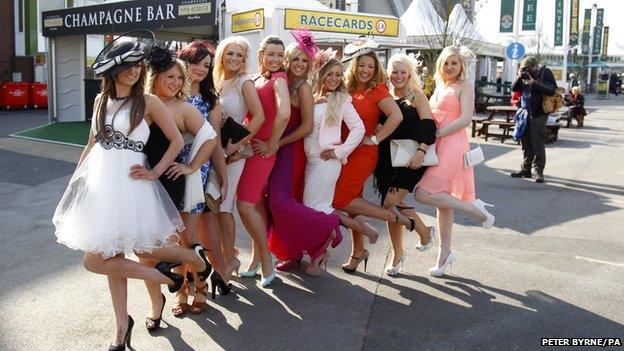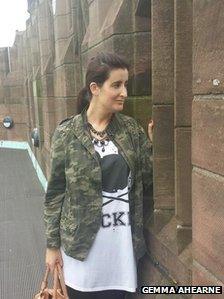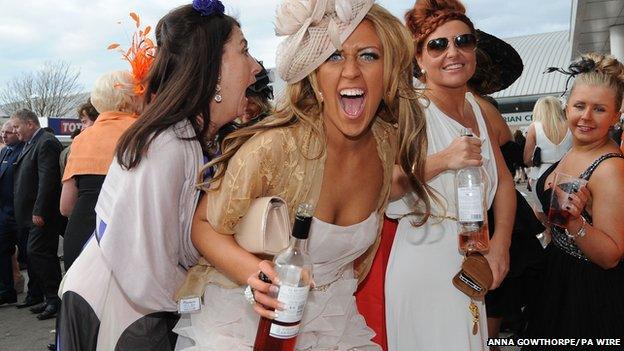Grand National stereotype fight back after unfair headlines
- Published

Many racegoers at Aintree dress up for Ladies' Day
It is a day when women from Merseyside are encouraged to dress in their finest clothes and enjoy a day at the races at Ladies' Day.
Yet the sophisticated image of the Grand National is far removed from the images in newspapers the day after of women falling over, or with underwear showing after being caught by gusts of wind.
It is something that Liverpool women academics, stylists and commentators are tired of, and the fight back has begun.
Liverpool fashion student Hannah Ramsay, who now lives in London, said that people there regard her accent as something "hysterically funny".
She wrote a paper on the north-south fashion divide as part of her degree course.
"I think the gap is closing between the north and the south in terms of fashion," she said. "There are always going to be people who want to do Liverpool down and resort to stereotypes no matter what we do, there are people who want to rip it to shreds."
She said she will not go to Ladies' Day as she does not want to judge other people subconsciously.
"People in Liverpool do want to look good and not adhere to the norm," she added.

Gemma Ahearne says the working classes have been vilified
Gemma Ahearne, external, a sociology and criminology lecturer and PhD student, said the negative coverage is part of the "vilification of the working classes", who are "not regarded as being worthy of being at the races".
She used Aintree as a case study when she examined how the media portrays women and she believes it targets women and defines them as "Chavs" who are held up as "defective" and to be mocked.
Ms Ahearne said: "I don't go to the National as it's cruel to the horses, but I have friends who go and hate how women are treated and portrayed as caricatures," she said.
She believes the media are "misogynistic and disapproving of women who are hyper-confident, and such coverage aims to regulate their behaviour".
"The comments below the line on these articles are disgusting and you get a differentiation at Cheltenham and Ascot, where the language and semantics talks of fashionable fillies," she added.
Jennina O'Neill, manager of the Met Quarter shopping district in Liverpool, said it was disappointing the press focus on the same stereotypes year after year.
She said: "It's important to celebrate individuality, but the focus should be on style, it would be nice to see more stories showcasing some of the great looks at the races."
Interestingly, she does not believe it has a major impact on the city as she said "every city has to deal with certain stereotypes."

Aintree receives different coverage in the media compared to other races according to Andy Heath
She agreed that women in Merseyside take pride in their appearance, but said there were lots of different looks in the city. "One thing we notice from our shoppers is the appetite for individuality", she added.
Andy Heath, the deputy managing director of Merseyrail, said they had seen a marked change in the behaviour of racegoers - for the better - over the last four or five years.
"There is a well-trodden stereotype of Ladies' Day that people turn up in their finery and stagger out at the end of the day," Mr Heath said.
Merseyside Police Supt Paul Wilson said anti-social behaviour would not be tolerated and he asked people to treat the area with respect.

Flip-flops are handed out to those who get sore feet
Last year, there were just 16 arrests during the three-day festival - five on Ladies' Day. None were women, the force said.
Merseyrail has introduced bylaws that prevent people who are extremely intoxicated travelling. Music is played and coffee sold in pop-up stores to create a good atmosphere.
Over the three days, Mr Heath said the rail company transports 100,000 people - half on Saturday and 30,000 on Ladies' Day. Trains double in frequency to every seven minutes and 12,000 flip-flops are handed out.
The flip-flop giveaway also prevents escalator accidents at Liverpool stations, Mr Heath added.
While not denying that people may indulge too much, he said they were "a very small minority." "You don't get this sort of publicity at other events such as York or Ascot," he added. "It's a very jaundiced and unfair reflection on women in Liverpool."
- Published5 April 2013